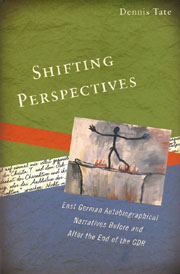Book contents
- Frontmatter
- Contents
- Acknowledgments
- List of Abbreviations
- Introduction: East German Autobiographical Narratives: Challenging Conventional Genre Distinctions
- Part 1 Historical Overview
- Part 2 Case Studies in Autobiographical Writing
- 2 Brigitte Reimann: The Constraints of First-Person Fiction
- 3 Franz Fühmann: The Deconstruction of an “Exemplary” Biography
- 4 Stefan Heym: Strategies of Self-Concealment in Fictional and Autobiographical Mode
- 5 Günter de Bruyn: From the ”Lies” of Fiction to the “Truth” of Autobiography?
- 6 Christa Wolf: “Subjective Authenticity” in Practice: An Evolving Autobiographical Project
- Bibliography
- Index
3 - Franz Fühmann: The Deconstruction of an “Exemplary” Biography
from Part 2 - Case Studies in Autobiographical Writing
Published online by Cambridge University Press: 05 February 2013
- Frontmatter
- Contents
- Acknowledgments
- List of Abbreviations
- Introduction: East German Autobiographical Narratives: Challenging Conventional Genre Distinctions
- Part 1 Historical Overview
- Part 2 Case Studies in Autobiographical Writing
- 2 Brigitte Reimann: The Constraints of First-Person Fiction
- 3 Franz Fühmann: The Deconstruction of an “Exemplary” Biography
- 4 Stefan Heym: Strategies of Self-Concealment in Fictional and Autobiographical Mode
- 5 Günter de Bruyn: From the ”Lies” of Fiction to the “Truth” of Autobiography?
- 6 Christa Wolf: “Subjective Authenticity” in Practice: An Evolving Autobiographical Project
- Bibliography
- Index
Summary
Condemned to Obscurity? The Postunification Neglect of Fühmann
LIKE BRIGITTE REIMANN, Franz Fühmann died within the lifetime of the GDR, in his case in July 1984 at the age of 62. In terms of their current literary reputations, however, they appear to have little in common. There is no single work of Fühmann's to place alongside Franziska Linkerhand as evidence of his continuing importance, and no postunification resurgence of interest to compare with the Reimann renaissance since the middle 1990s, stimulated by the new insights into her life provided by her posthumously released diaries and correspondence as well as by the publication of the uncensored text of her magnum opus.
Obvious reasons for these differences can be located in their contrasting career patterns and in the wider range of Fühmann's output as a writer. Fühmann, who was born more than a decade before Reimann and outlived her by a similar time span, was in the forefront of GDR cultural life for over thirty years, more than twice as long as she was. His fortunes were transformed during Honecker's cultural liberalization of the early 1970s, whereas the only benefit it provided for Reimann as she approached the end of her life was the opportunity to get Franziska Linkerhand into print in something close to its intended form. Fühmann's special relationship with his publisher, the Hinstorff Verlag in Rostock, meant that he was able to have the bulk of his creative writing published the way he wanted in the nine-volume Werk-ausgabe, which appeared between 1977 and 1988 (the last two volumes posthumously).
- Type
- Chapter
- Information
- Shifting PerspectivesEast German Autobiographical Narratives before and after the End of the GDR, pp. 101 - 127Publisher: Boydell & BrewerPrint publication year: 2007



